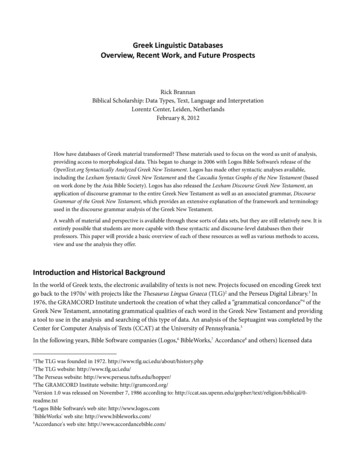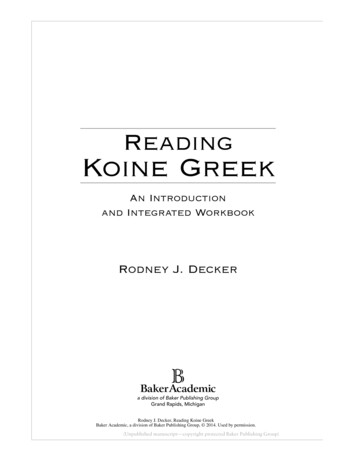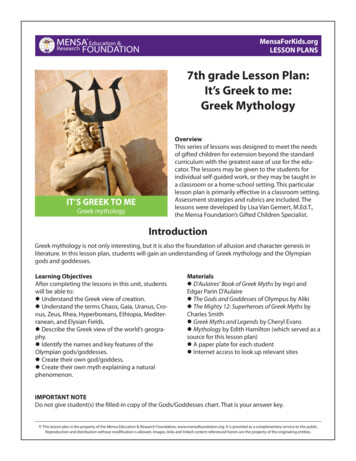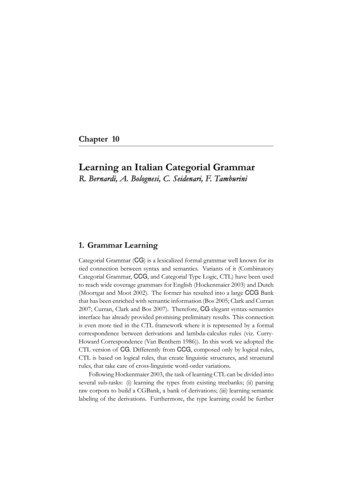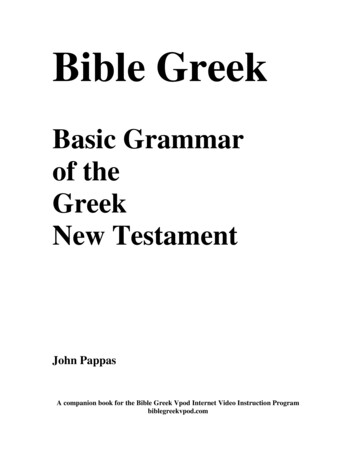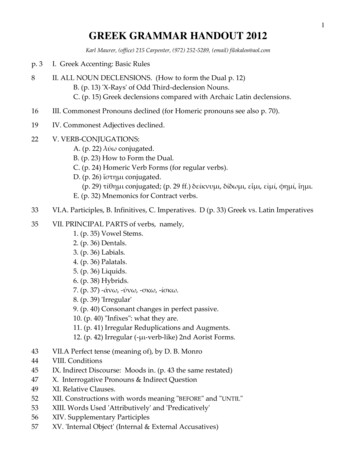
Transcription
1GREEK GRAMMAR HANDOUT 2012Karl Maurer, (office) 215 Carpenter, (972) 252-5289, (email) filokalos@aol.comp. 3I. Greek Accenting: Basic Rules8II. ALL NOUN DECLENSIONS. (How to form the Dual p. 12)B. (p. 13) 'X-Rays' of Odd Third-declension Nouns.C. (p. 15) Greek declensions compared with Archaic Latin declensions.16III. Commonest Pronouns declined (for Homeric pronouns see also p. 70).19IV. Commonest Adjectives declined.22V. VERB-CONJUGATIONS:A. (p. 22) λύω conjugated.B. (p. 23) How to Form the Dual.C. (p. 24) Homeric Verb Forms (for regular verbs).D. (p. 26) ἵστημι conjugated.(p. 29) τίθημι conjugated; (p. 29 ff.) δείκνυμι, δίδωμι, εἶμι, εἰμί, φημί, ἵημι.E. (p. 32) Mnemonics for Contract verbs.33VI.A. Participles, B. Infinitives, C. Imperatives. D (p. 33) Greek vs. Latin Imperatives35VII. PRINCIPAL PARTS of verbs, namely,1. (p. 35) Vowel Stems.2. (p. 36) Dentals.3. (p. 36) Labials.4. (p. 36) Palatals.5. (p. 36) Liquids.6. (p. 38) Hybrids.7. (p. 37) -άνω, -ύνω, -σκω, -ίσκω.8. (p. 39) 'Irregular'9. (p. 40) Consonant changes in perfect passive.10. (p. 40) "Infixes": what they are.11. (p. 41) Irregular Reduplications and Augments.12. (p. 42) Irregular (-μι-verb-like) 2nd Aorist Forms.434445474952535657VII.A Perfect tense (meaning of), by D. B. MonroVIII. ConditionsIX. Indirect Discourse: Moods in. (p. 43 the same restated)X. Interrogative Pronouns & Indirect QuestionXI. Relative Clauses.XII. Constructions with words meaning "BEFORE" and "UNTIL"XIII. Words Used 'Attributively' and 'Predicatively'XIV. Supplementary ParticiplesXV. 'Internal Object' (Internal & External Accusatives)
258596569707172.XVI. 'Active' & 'Passive' Verbal Nouns & AdjectivesXVII. PREPOSITIONS: English to Greek. (p. 63 Time Expressions)XVIII. Prepositions: Greek to English.XIX. NUMERALS (& the four Greek letters used only as numerals) by Patrick CallahanXX. Table of ATTIC versus HOMERIC (etc.) forms for Nouns and PronounsXXI. Greek Words for ‘Come’ and ‘Go’XXI. Map of the Greek Dialects, by L. R. Palmer*******But WHY LEARN GREEK? An answer I think is implicit in this limpid little poem by Thomas Hardy:IN THE BRITISH MUSEUM'What do you see in that time-touched stone,When nothing is thereBut ashen blankness, although you give itA rigid stare?'You look not quite as if you saw,But as if you heard,Parting your lips, and treading softlyAs mouse or bird.'It is only the base of a pillar, they'll tell you,That came to usFrom a far old hill men used to nameAreopagus.'— 'I know no art, and I only viewA stone from a wall,But I am thinking that stone has echoedThe voice of Paul,'Paul as he stood and preached beside itFacing the crowd,A small gaunt figure with wasted features,Calling out loud'Words that in all their intimate accentsPattered uponThat marble front, and were far reflected,And then were gone.'I'm a labouring man, and know but little,Or nothing at all;But I can't help thinking that stone once echoedThe voice of Paul.'
3(I) Basic Rules For Greek AccentsMuch of this is for beginners; but some particular rules are for advanced students too (especially in § IX). Here "ult" meansa word's last syllable; "penult" the second-to-last, "antepenult" the third from last.Mastery of accents comes only slowly, because their rules are complex; but you should not, indespair, just ignore them. If you ignore them, you can never pronounce Greek properly, or"hear" it in your inner ear. And then (a) memorizing inflections is far harder, and (b) againand again you miss vital information, given just by accents. E.g. μένω "I stay", μενῶ "I willstay"; or e.g. ἐν "in", ἕν "one thing"; or e.g. ἤν "if", ἥν "whom", ἦν "I was".At first, the rules might make your head spin; but this does not last forever. If you payclose attention for just a few weeks, it all begins to seem easy.(I) All ancient Greek words are accented (except the few listed below in § IX). They are pitchaccents (see § III), but helping to fix the pitch in any word is another factor, quantity (a vowel'slength; how long it takes to say it: see § II). Unfortunately we native English speakers areinsensitive to both; we tend to hear only a word's stress. So in speaking Greek at first juststress every acute-accented or circumflex-accented syllable (but not the grave-accented: see §IV). The modern Greeks do the same (see § X).(II) Definition of "long" and "short" vowels (needed for all rules in §§ III - IX):Always short: only -ε- and -ο- .Always long: -η-; -ω- (except in -ις -εως and -υς -εως nouns); & diphthongs. A"diphthong" any two-vowel combination except final -αι and -οι. Those are nearly alwaysshort (e.g. μοῦσαι, λύομαι, ἄνθρωποι); long only in the optative, 3rd pers. sing. (e.g. παύοι &παύσαι).Either long or short : -ι- , -υ-, α-. In stems they are either long or short (you just have tolearn that when you learn the word. Long for example is the stem-vowel in σῖτος, λῦσαιπ σα.) But for accent, the stem-vowel is much less important than inflections; and here onecan say:-ι- and -υ- in inflections are always short.-α- in inflections is always short -- except in 1st-declension feminine. There, -ας is alwayslong; but -α and -αν -- i.e. the nom. and accus. singular -- can be either long or short.In sum, the only really big nuisance is -α- in first-declension feminines, since there nom.and acc. -α and -αν can be either long or short. For the rules, see the rhyme in § VIII.(III) Three kinds of accent: G r a v e \ : the speaker's voice remained low in pitch (i.e. graveaccent is not pronounced--see § IV), C i r c u m f l e x : the voice rose in pitch, then fell (see §IV), A c u t e / the voice rose in pitch.What kind of accent is used is largely a matter of "vocabulary" -- i.e. you learn any word'saccent-patterns when you "learn" the word itself -- but we can generalize at least this much:(1) G r a v e \ is only on the ult. It appears wherever a word accented on the ult isfollowed by another accented word. As was said above, grave accent is not pronounced; its chieffunction is to signal, to the eye, that another word is coming. So the formula is: a word
4accented on the ult gets a grave if followed by another accented word, and an acute if followedby punctuation, or by an enclitic (i.e. by a word not accented -- for a list of enclitics see § IX).(2) C i r c u m f l e x can fall only on a long penult or long ult (never before the penult,and never on a short syllable). It appears on any accented penult if that is long, and the ult short,e.g. χεῖρα. It appears on any accented ult which (a) is a genitive or dative ending; or (b) is acontraction (e.g. in contract verbs; in futures of liquid verbs; in any ult containing iota subscript;in all 1st-declension genitives plural, e.g. ἀδικιῶν * -άων , στρατιωτῶν * -άων etc.)(3) A c u t e / can fall on the ult, the penult, or the antepenult (but never prior to that).(IV) More about the 3 kinds of accent (quotations from Smyth §155 -156).Re g r a v e: "The ancients regarded the grave originally as belonging to every syllablenot accented with the acute or circumflex; and some MSS show this in practice, e.g.πὰγκρὰτής. Later it was restricted to its use for a final acute." That someone could write"πὰγκρὰτής" shows that the ancients did not stress grave-accented syllables. (You can verifythis yourself by reading aloud almost any Greek sentence: if you ignore the grave accents, itsounds vastly more natural.) The function of written grave accent is purely analytical: it helpsto show the grammar, and shows how the word would be accented if it were not followed byanother word.Re c i r c u m f l e x: It is "formed from the union of the acute and the grave ( ),never from . Thus, παῖς πάὶς, εὖ ἔὺ. Similarly, since every long vowel may be resolvedinto two short units (morae) τῶν may be regarded as τόὸν. The circumflex was thus followedby a rising tone followed by one of lower pitch. μοῦσα, δῆμος are thus μόὺσα, δέὲμος."Because of this rise and fall on circumflex syllables, ancient Greek must have soundedsing-song, like modern Swedish or -- it is said -- Lithuanian. (Those are the only two modernEuropean languages in which the pitch accent dominates, as in ancient Greek.) But for Englishspeakers, it seems best to stress every circumflex, just as if it were an acute.(V) An inflected word has any of three accent-patterns. Any word not inflected -- e.g.adverb, conjunction, preposition -- has no "accent-pattern", only a fixed accent which neverchanges (except from acute to grave, as in § III.1 above), and you just learn it when you learnthe word. But the accenting of a noun, adjective, or verb does change as its ending changes,and as you learn the declensions and conjugations, you will notice the following threepatterns. (I here ignore the term "persistent" which other books use for nouns and adjectives;on that see the Appendix.)(1) R e c e s s i v e, when the accent moves from the ult as far as it can. When the ult isshort, the accent recedes to the antepenult; when the ult is long, the accent is pulled to thepenult. E.g. noun φύλακες φυλάκων φύλαξι etc. (-ες is short, -ων long, -ι short, etc.); or adj.δίκαιος δικαίου δικαίῳ etc. (-ος is short, -ου & -ῳ long) or (verb) ἔλυον ἔλυες ἔλυε etc.Recessive are (a) most verb forms (for exceptions see § VI) and (b) many nouns and adjectives.(2) F i x e d, when the accent stays on the penult or ult (i.e. the accent never moves; it onlychanges from acute to circumflex, or acute to grave as in § III.1 & 2 above). Fixed accent is
5found: (a) in many nouns, e.g. ("fishes") ἰχθύες ἰχψύων ἰχψύσι etc. (there it is always on thepenult); (b) in many adjectives, e.g. ἀγαθός, -θοῦ, -θόν etc. (there, always on the ult); (c) in afew verb-forms (all of which are listed in § VI below).Note that in a great many 3rd-decl. nouns and adjectives -- e.g. ("fish") ἰχθύς, ἰχθύος,ἰχθύι, ἰχθύα etc.; or ("having left") λιπών, -όντος, -όντι, -όντα etc. -- the accent should be seenas "fixed" on the penult even though the nom. singular has an ultimate accent. You can justsay to yourself that, in such words, the nom. sing. is "missing" a syllable.(3) "Q u i r k y" is anything not obeying rules of "fixed" or "recessive". The only reallycommon quirky words -- those that you should try very hard to remember -- are these:(a) 3rd-declension monosyllables (i.e. words whose nom. sing. has 1 syllable) have gen. &dat. accent on the ult, e.g. (sing.) χεῖρ χειρός χειρί χεῖρα, (plural) χεῖρες χειρῶν, χερσί,χεῖρας.(b) several 3rd-decl. disyllables also have gen. & dat. accent on the ult. E.g. μήτηρμητρός μητρί μητέρα etc.; πατήρ πατρός πατρί πατέρα etc.; ἀνήρ ἀνδρός ἀνδρί, ἄνδρα etc.;γυνή γυναικός γυναικί γυναῖκα etc.; οὐδείς (& μηδείς) οὐδενός οὐδενί οὐδένα etc.(c) 1st-decl. gen. plural:, e.g. (nom.) ἄναγκαι, (gen.) ἀναγκῶν (because it is really acontraction of Homeric ἀναγκάων).(VI) List of verb forms that have "fixed" accent. Most verb forms are "recessive" (as was saidabove); I here list those that are "fixed" (note that this includes the feminines of all participleslisted here; e.g. λυθεῖσα, -είσης, -είσῃ, -εῖσαν etc.; λελοιπυῖα, -υίας etc.; λιποῦσα, λιπούσηςetc.)(1) R e g u l a r v e r b (e.g. λύω or λείπω) has fixed accent only in:1 AORIST ACTIVE infinitive (e.g. παιδεῦσαι)2 AORIST ACTIVE infinitive (λιπεῖν), participle (λιπών, -οῦσα, -ον)2 AORIST MIDDLE infinitive (λιπέσθαι) (participle is normal: λιπόμενος)AOR. PASS. inf. (λυθῆναι), partic. (λυθείς -εῖσα -έν), subjunct. (λυθῶ λυθῇς λυθῇ etc.)PERFECT ACT. infinitive (λελυκέναι), participle (λελυκώς, -κυῖα, -κός etc.)PERFECT MIDDLE infinitive (λελῦσθαι), participle (λελυκομένος etc.)AOR. & PERF. optatives plural may seem to have fixed accent; e.g. -εῖμεν, -εῖτε, -εῖεν. But those are really justcontractions of -είημεν, -είητε, -είησαν.(2) - m i v e r b s have those same "fixed" accents, and also:PRES. ACT. inf. (e.g. τιθέναι, ἰέναι), partic. (τιθείς, ἰείς), subjunct. (τιθῶ, ἰῶ).(3) C o n t r a c t v e r b (1) above, plus contractions in PRES. & IMPF.(VII) A difficulty with some polysyllabic first-declension nouns. From any noun'sdictionary entry, which lists its nom. and gen. singular, you can normally discern its accentpattern (for a complete list see my noun table). But with some polysyllabic 1st-declensionnouns, the information "ἀνάγκη, -ης, ἡ" or "πολίτης, -ου, ὁ" does not tell you if the accent is"recessive" (in which case the nom. pl. would be ἄναγκαι, πόλιται) or "fixed" (so that the nom
6pl. would be ἀνάγκαι, πολῖται). There is no "solution" to this problem; you can only, forexample, look in a bigger dictionary, in the hope that the nom. plural might appear in one ofthe quotations!(VIII) The 4 types of first-declension feminine. I here list them (adapting this from Smyth§ 218 ff.) because Chase & Phillips p. 11 does not do it clearly. Here the initial Greek letters,e.g. "η-ης", refer to the nom. and gen. singular. Here "short -α, -αν" and "long -α, -αν" refersonly to the nom. & acc. sing. (other endings, except nom. pl. -αι, are all long).(A) η-ης. E.g. νίκη, νίκης, νικῃ, νίκην etc.(B) α-ας (long -α, -α): after -ρ- (if -ρ- not like those in C.1), -ι- (if -ι is like not those in C.2), ε-. So e.g. χώρα, -ας; οἰκία, -ας; γενεά, - ς.(C) α-ας (short -α, -α): (1) if the word ends -εια, -οια, or τρια (e.g. βασίλλεα, διάνοια,ψάλτρια; but for some exceptions see Smyth §219-20); (2) if it ends in -ρα after diphthong orlong -υ- (e.g. μοῖρα, γέφυρα).(D) α-ης (short -α, -αν): if -σ-α, -σσ-α, -ξ-α, -ψ-α, -ττ-α, -ζ-α, -λλ-α, -αινα.(e.g. Μοῦσα, θάλασσα, ἅμαξα, ῥίζα, γλῶττα, ἅμιλλα, λέαινα)"A" is easy to remember; but B, C, D (i.e. all feminines ending in -α) give trouble, becausethey are so easily confused. So I summarize them in this rhyme, which you should memorize.(This omits only -λλ-α, -αιν-α in D, which I couldn't see how to cram into the rhyme):Long -α, χώρα and οἰκία.Short -α, -εια, -οια, -τρια.Short -ρα after dipththong, -ῦ-.Short -α -ης with -s- and -t-.Particularly worth remembering is "short -α -ης with -s- and -t-" (i.e. when the stem ends withan "s" or "t" sound); for it includes a huge number of feminines of adjectives and participles; e.g.λύουσα, λυούσης, λυούσῃ, λύουσαν. The "-εια -οια -τρια" type is rarer, but does include thefeminines of all adjectives in -ύς, -εῖα -ύν (e.g. γλυκύς: fem. γλυκεῖα -είας -είᾳ -εῖαν etc.).(IX) Unaccented words are "proclitic " ("leaning forward") or "enclitic" ("leaning on"). They arecalled that because a proclitic is often felt as part of the following word (e.g. the article, e.g. ὁνήπιος, "the fool"); an enclitic, as part of the preceding word. (Thus, an enclitic can even causethe preceding word to receive a second accent; e.g. νήπιός τις, "some fool", "a certain fool".For, since νήπιός τις is felt as a single word, to write "νήπιος τις" would violate the rule that oneof a word's last three syllables must be accented.)P r o c l i t i c are (1) the definite article, masc. or fem. nominative: ὁ, ἡ, οἱ, αἱ, (2) the threeprepositions ἐν ('in'), ἐκ / ἐξ ('from'), εἰς ('to', 'into', 'towards'), and (3) the words εἰ, ὡς and οὐ/ οὐκ / οὐχ ( "if", "so that" and "not").E n c l i t i c are: (1) personal pronouns, μου μοι με, σου σοι σε, and (epic/archaic) οὑ οἱἑ, (2) the indefinite pronoun τις τι in all cases, (3) the indefinite adverbs που, πῃ, ποι, ποθεν,ποτε, πω, πως, (4) four particles, viz. γε, τε, τοι, περ, and (5) two verbs, viz. εἰμι and φημι,
7when they have two syllables and are in the present indicative.SPECIAL RULES FOR ἐ σ τ ί : accent it ἔστι (A) if it is the first word; (B) when it means"it is possible" (ἔξεστι); (C) in the phrases ἔστιν οἵ, ἔστιν ὅτε etc.("there are those who" "somepeople", "there are times when" "sometimes"); (D) if it follows οὐκ, μή, εἰ, ὡς, καί, ἀλλά(ἀλλ') or τοῦτο.COMPOUND VERBS (Sm. § 426) have recessive accent, except that: (Α) the accent cannotprecede augment or reduplication (e.g. ἀπῆν, εἰσῆλθον, ἀφῖκται); (Β) the accent cannotprecede the 2nd syllable of a 2-syll. prefix (e.g. περίθες) or the 2nd of two prefixes (e.g.συγκάθες); and (C) accent remains unchanged in infinitives (e.g. παρεῖναι, not πάρειναι),participles (e.g. παρών), aorist & pf. passive.WORD BEFORE AN ENCLITIC: if it has antepenult. accent, add acute to ult, e.g.ἄνθρωπός τις, ἄνθρωποί τινες. If penult. acute accent, it stays unchanged, e.g. λόγος τις; butif the enclitic is disyllabic, you accent its second syllable: λόγοι τινές. If penult. circumflex,add acute to ult, e.g. χεῖρά τινα, χεῖρές τινες. If ult accent, it stays unchanged: τιμαί τε, τιμῶντινων, ἤν τις etc.IF ENCLITICS FOLLOW ONE ANOTHER, each except the last gets an acute (always onits first syllable), e.g. ἤ νύ σέ που θέος ἴσχει, "Surely now some god, I guess, possesses you".(X) Ancient Greek versus modern Greek accenting. To pitch in individual words, themodern Greeks have as little sensitivity as we; like us they simply stress the ancient pitchaccents, and do not differentiate between circumflex and acute. (Until several decades ago,they still used circumflex and grave accents in writing; but in the mid 1980's the Greekgovernment, taking pity on school children, abolished all accents but the acute.) This loss offeeling for pitch, and the shift to stress, should be assigned to the last few centuries B.C., asseems plainly indicated by two facts:(a) The classical Greeks did not write accent marks -- no doubt because they did not needthem. The present accent system was invented (or given its present form) in about 200 B.C. bya great Alexandrian scholar, Aristophanes of Byzantium, precisely because the pitch accentswere already becoming uncertain. (One root cause of this was that, a bit like English today,Greek had now become a koinê spoken, often poorly, by millions of "foreigners".)(b) In the change from classical Greek to the Hellenistic koinê, one can also detect a drasticchange in word order -- from the extreme freedom of classical Greek to a comparative rigidity,resembling that of most modern languages -- apparently for the following reason.We now use pitch for emphasis in a sentence. It is mostly by pitch that we differentiatebetween: "Í told you that", "Í told you that?"; "I told yóu that", "I told yóu that?"; "I told youthát", "I told you thát?" -- etc. (that one tiny sentence can have a dozen different variants,differentiated just by pitch). But in classical Greek, pitch did not belong to the sentence; it wasa property of individual words. So the same differentiation had to be done by particles, andby word order: ἐγώ γε ἐκεῖνό σοι εἶπον, εἶπόν σοι ἐκεῖνο, σοί γε ἐκεῖνο εἶπον, etc.This, then, is one reason why classical Greek word order is so flexible, and why it teemswith sentence-particles, for many of which we lack an equivalent. But already in the New
8Testament, the particles in common use are fewer, and the word order drastically closer toours. This must mean that the feeling for pitch in separate words was already ebbing.Such at least is the ingenious, plausible hypothesis of George Thompson, in his paper"On the Order of Words in Plato and Saint Matthew", The Link #2, June 1939, 7-17. I quote fromhis conclusion (p. 16-17):The conclusion to which all this evidence points is that, by the beginning of the Christian era, thefunction of position in marking emphasis and the function of the modal particles in marking othershades of meaning were being taken over by intonation of the voice. The fundamental change whichhad taken place was therefore the decay of the pitch accent. When pitch had been replaced by stress,the vocal intonation [i.e. pitch] became free, and consequently the flexible word order and the modalparticles were rendered superfluous.Appendix: ABOUT THE TERMS "PERSISTENT" & "RECESSIVE"It is customary to say that nouns and adjectives have "persistent" accent; that is, that they"accent, in the oblique cases, the same syllable as is accented in the nominative, if the length of ultima permits"(Chase & Phillips p. 11; cf. Smyth § 205). Unfortunately, this rule needs X-ray vision; students are notlinguists, and they see this 'rule' simply defied (A) by all the 3rd-declension monosyllables, e.g. παίς,παιδός, παιδί, παῖδα etc. (what to a student will seem "persistent" there?), and (B) by hundreds ofother nouns of the sort discussed in § VII, e.g. sing. ἀνάγκη, pl. ἄναγκαι.For teaching purposes I therefore discard "persistant" and speak only of "fixed" (e.g. sing.πολίτης, pl. πολῖται), "recessive" (e.g. sing. ἀνάγκη, pl. ἄναγκαι), and "quirky" (e.g. 3rd-decl.monosyllables). Of course, by applying the term "recessive" to nouns and adjectives, I misuse it; but asa purely descriptive term at least it "works" far more often! It fails only with the neuters of activeparticiples, but those can be regarded as a "quirk" or wrinkle; e.g. παιδεύων, παιδεύοντος etc., neuterπαιδεῦον (not παίδευον, which it would be if strictly "recessive").(II) L i s t o f A l l G r e e k N o u n I n f l e c t i o n sAll nouns here are masc. (or masc.-fem., in some words for animals) unless preceded by thefem. or neuter article. A parenthesis like "νοῦ (& νόος)" means that both forms are attested (inparenthesis I put the rarer). A parenthesis like "νοῦ ( νόου)" means that νοῦ is a contractedform and νόου is its hypothesized or attested 'original'. For Homeric forms see also p. 70.Accent symbols: - C contracted (CU contracted with accented ult; CP contracted with accentedpenult; CR contracted with recessive accent); - D disyllable (accent either "fixed" or "recessive", butit doesn't matter); - M 3rd-decl. monosyllable (ML if the vowel is long); - P penultimate "fixed"accent (PL if the penult is long); - R "recessive" accent (R2 if it has only 2 syllables; R2L 2 syllableswith long stem vowel); - U accent "fixed" on the ultima.1st DECLENSION all feminines ending -η or -α, masculines ending -ης and -ας. Notethat all 1st-declension genitives plural are accented -ῶν ( contraction of Homeric -άων, Ionic ν: Smyth §214.d.8). On a problem accenting polysyllabic words see the Accent pages, § VIII.
9η-ης -U-PL-R-Cᾱ-ας -U-R-Uᾰ-ας -DL-Rᾰ-ης -D-DL-R3ας-ου -P-C*ης-ου -U-P-PL-Cἡ τιμ-ή, -ῆς, -ῇ, -ήν -αί, -ῶν, -αῖς, -άς(agreement) ἡ συνθήκη, -ης, -ῃ, -ην συνθῆκ-αι, συνθηκ-ῶν, συνθήκ-αῖς, -άς(necessity) ἡ ἀνάγκ-η, -ης, -ῃ, -ην ἄναγκ-αι, ἀναγκ-ῶν, ἀνάγκ-αις, -ας(fig tree) ἡ συκ-ῆ, -ῆς, -ῇ, -ῆν -αῖ, -ῶν, -αῖς, - ς ( συκ-έα, -έης κ.τ.λ.)(joy) ἡ χαρ-ά, - ς, -ᾶ, -άν -αί, -ῶν, -αῖς, -άς(house) ἡ οἰκί-α, -ας, -ᾳ, -αν -αι, οἰκι-ῶν, οἰκί-αις, -ας(mina) ἡ μν- , - ς, -ᾶ, - ν -αῖ, -ῶν, -αῖς, - ς ( -άα, -άας, -άᾳ κ.τ.λ.)(fate) ἡ μοῖρ-α, μοίρ-ας, -ᾳ, μοῖρ-αν μοῖρ-αι, μοιρ-ῶν, μοίρ-αις, -ας(aid) ἡ ὠφέλει-α, ὠφελεί-ας, -ᾳ, ὠφέλει-αν -αι, ὠφελει-ῶν, ὠφελεί-αις, -ας(root) ἡ ῥίζ-α, -ης, -ῃ, -αν -αι, ῥιζ-ῶν, ῥίζ-αις, -ας.(muse) ἡ μοῦσ-α, μούσ-ης, -ῃ, μοῦσ-αν -αι, μουσ-ῶν, μούσ-αις, -ας(rivalry) ἡ ἅμιλλ-α, ἁμίλλ-ης, -ῃ, ἅμιλλ-αν -αι, ἁμιλλ-ῶν, ἁμίλλαις, -ας(steward) ταμί-ας, -ου, -ᾳ, -αν -αι, ταμι-ῶν, ταμί-αις, -ας(N. wind) Βορρε- ς, -οῦ, - , - ν (no plural) ( -έας, -έου, -έα, -έαν )(poet) ποιητ-ής, -οῦ, -ῇ, -ήν -αί, -ῶν, -αῖς, -άς.(Hades) Αἴδ-ης (& ᾅδ-ης), -ου (& -αο), ῃ, -ην (no plural attested)(citizen) πολίτ-ης, -ου, -ῃ, -ην πολῖτ-αι, πολιτ-ῶν, πολίτ-αις, πολίτ-ας(Hermes) 'Ερμ-ῆς, -οῦ, -ῇ, -ῆν -αῖ, -ῶν, -αῖς, - ς ( -έας, -έου κ.τ.λ.)(honor)*AlsoN.B. the Homeric -ης -αο and -ης -εω, and Doric -ης -α (Smyth 214.D.5, 225). So thegenitive of Ατρείδης (son of Atreus) can be Ατρείδ-αο, Ατρείδ-εω, or Ατρείδ-α.2nd DECLENSION masc. (more rarely, fem.) -ος, -ου ορ -ους, -ου; neut. -ον, -ου or -ουν, ου. ACCENTS, Note that "-P", fixed penultimate accent, is rare. Usually "-P" nouns derivefrom adjectives, which in turn derive from 1st-decl. nouns. E.g. ἀρχεῖον from ἀρχαῖος -α -ονfrom άρχή; τροπαῖον (trophy) from τροπαῖος -α -ον from τροπή (turning); the nameΓογγύλος from γογγύλος -η ον (round). So when your dictionary leaves you in doubtwhether a word has recessive accent or fixed, it is probably recessive.ον-ου-U-PL-Rος-ου-U-P-Pτὸ φυτ-όν, -οῦ, - , -όν -ά, -ῶν, -οῖς, -ά(town hall) τὸ ἀρχεῖ-ον, ἀρχεί-ου, -ῳ, ἀρχεῖ-ον -α, ἀρχεί-ων, -οις, ἀρχεῖ-α(organ) τὸ ὄργαν-ον, ὀργάν-ου, -ῳ, ὄργαν-ον -α, ὀργάν-ων, -οις, ὄργαν-α(doctor) ἰατρ-ός, -οῦ, - , -όν -οί, -ῶν, -οῖς, -ούς (so too fem., e.g. ὁδός, νῆσος)(chronicler) λογογράφος, -ου, -ῳ -ον -οι, -ων, -οις, -ους(dialogue) διάλογ-ος, διαλόγ-ου, -ῳ, διάλογον -οι, διαλόγ-ων, -οις, -ους (so ἡ κάθοδος(plant)2ND-DECLENSION CONTRACTEDουν-ους-C: neuter contracted noun (bone) τὸ ὀστοῦν, -οῦ, -ῶ, -οῦν - , -ῶν, -οῖς, - ους-ου-C:· (mind) ν-οῦς, -οῦ (& -όος),- (& -όι), -οῦν (& -όα) -οῖ (& -όες), -ῶν, -οῖς, -οῦς (& -όας);( Attic form of νόος, νόου, νόῳ, νόον νόοι, νόων, νόοις, νόους. But sometimes-- esp. in the plural-it imitates the 3rd-decl. (hence the forms I introduce "(&.)". So too θροῦς, ῥοῦς, χνοῦς, χοῦς, πλοῦς.-CP: (sailing round) περίπλ-ους, -ου, -ῳ, -ουν -οι (& -οες), -ων, -οις, -ους (& -οας)
102ΝD-DECL. "ATTIC" DECLENSIONως-ω-P (reef) ὁ κάλ-ως (& epic & Ionic κάλος), -ω, -ῳ, -ων -ω (& -οι), -ων, ῳς, -ως.ως-ω-U (peacock) ὁ τα-ώς, -ώ (& -ῶ), - , -ών -ῴ, ῶν, - ς (& -ῶσι), -ώς (& -ῶς, -ῶνας)3rd DECLENSION any noun whose gen. singular ends in -ς (i.e. in -ος, -ους, -ως). Do notdespair at the seeming vastness and complexity of the 3rd declension! Many of theseparadigms are rare; I underline those that are commonest, and so for beginners mostimportant. Six quirky but important nouns, all disyllables accented like monosyllables, arelisted together at the very end, ἀνήρ man, γυνή woman, μητήρ mother, πατήρ father, οὐδείςno one, οὐδέν nothing.( )-κτος -Ρ2( )-ος -Ρ2-ΜL( )-τος -Ρ2L-Rας-εοςας-ως -RC(milk)ης-ους- CP(trireme)ις-εως- R2-R2L-R(city)τὸ γάλα, γάλα-κτος, -κτι, γάλα γάλα-κτα, γαλά-κτων, γάλαξι, -κτα(tear) τὸ δάκρυ, δάκρυ-ος, -ι, δάκρυ δάκρυ-α, δακρύ-ων, δάκρυ-σι, -α(beast) θήρ, θηρ-ός, -ί, θῆρ-α θῆρ -ες, θηρ-ῶν, θηρ-σί, θῆρ-ας(body) τὸ σῶμα, σώμα-τος, -τι, σῶμα σώμα-τα, σωμά-των, σώμα-σι, -τα(lesson) τὸ μάθημα, μαθήμα-τος, -τι, μάθημα μαθήματα etc.(ground) τὸ οὖδ-ας, οὔδ-εος, -ει, οὖδας (no plural attested)(prize) τὸ γέρ-ας, -ως, -ᾳ, -ας -α, -ῶν, -ασι, -α( γέρ-ας, -αος, -αι, -ας -αα, -άων, -ασσι, -αα)αυς-εως(ship) ν-αῦς, -έως, -ηί, -ῦν -ῆες, -εῶν, -αυσί, -αῦςIonic ν-ηῦς, -εός [Hom. -ηός , -ηί, -έα [-ῆα -έες [-ῆες , -εῶν [-ηῶν , -ηυσί, -έας [-ῆα ειρ-ερος-Μ (hand) ἡ χ-είρ, -ειρός (& -ερός), -ειρί (& -ερί), -εῖρα -εῖρες, -ειρῶν, -ερσί, -εῖρας-R (suicide) αὐτόχ-ειρ, -ειρος, -ειρι, -ειρα -ειρες, -είρων, -ερσι, ειραςεις-ενος-Μ (comb) κτ-είς, -ενός, -ενί, -ένα -ένες, -ενῶν, -εσί, -έναςευς-εως -Pc (horseman) ἱππ-εύς, -έως ( -ῶς), -εῖ, -έα (-ᾶ) -εῖς (-ης), -έων (-ῶν), -εῦσι (-έσσι), -έας (- ς).ην-εν -P(shepherd) ποιμ-ήν, -ένος, -ένι, -ένα -ένες, -ένων, -έσι, -ένας-R(male) ἄρρ-ην ( ἄρσην), -ενος, -ενι, -ενα -ενες, ἀρρ-ένων, ἄρρ-εσι, -εναςηρ-ερος - P (stomach) ἡ γαστ-ήρ, -έρος (& γαστ-ρός), -έρα -έρες, -έρων, -έραςης-εους-CR Περικλ-ῆς, -έους, -εῖ, -έα -εῖς, -έων, -έσι, -εῖς (& -ῆς, -έεος, -έει, -έεα etc.)ις-ιος-R2-Ρ2Lν-νος -R2-PL-ΜLξ-γος -Μἡ τριέρ-ης, -ους, -ει, -η -εις, -ων, -εσι, -εις(& τριέρ-ης, -εος, -εει, -εα -εες, -εων, -εσσι, -εες.So too nouns in -κράτης, e.g. ωκράτ-ης, -ους, -ει, -η (etc.)ἡ πόλ-ις (& -ιος)*, -εως, -ει, -ιν -εις, -εων, -εσι, -εις *see note under ις-ιος(knowledge) ἡ γνῶσ-ις, γνώσ-εως, -ει, γνῶσ-ιν γνώσ-εις, -εων, -εσι, -εις(president) πρύταν-ις, πρυτάν-εως, -ει, πρύταν-ιν πρυτάν-εις, -εων, -εσι, -εις Ν.Β. -ω- in the gen. is short; contrast -εύς, -έως above(seer) μάντ-ις, -ιος (& -εος, -ιδος), -ει, -ιν (& -ιδα) -εις (& -ιδες), -ίων, μάντ-εσι, εις (& -ιας, -ιδας) Ν.Β. ις-ιος is really the Ionic form of ις-εως.(fasting)νῆστ-ις, νήστ-ιος (& -ιδος), -ει, νῆστ-ιν νήστ-εις, νηστ-ίων, νήστ-εσι, -εις Eλλη-ν, Ελλη-νος, -νι, -να -νες, Ελλή-νων, Ελλη-σι, -νας(contest) ἀγώ-ν, ἀγῶ-νος, -νι, -να -νες, ἀγώ-νων, ἀγῶ-σι, -νας(sedge) σφή-ν, σφη-νός, -νί, σφῆ-να -νες, -νῶν, -σί, σφῆ-νας(flame) ἡ φλό-ξ, φλο-γός, -γί, φλό-γα -γες, φλο-γῶν, φλο-ξί, φλό-γας(Hellene)
11-Μ-PL-R2ξ-κος -R2ξ-κτος -R2-Μξ-χος ς Pους-ουντοςους-ωτοςρ-τος -R2ς-δος -P-R2-ΜLς-θος -R2ς-νος -LP-R2-ΜLς-ντος -P-R-PLς-ος -Ρ2-ΜL-Μς-τος -Ρ2-ΜL-ΜL-PLς-ρος -R2υ-ατος -R2υ-εος- R(goat) ἀί-ξ,αἰ-γός, -γί, αἶ-γα -γες, αἰ-γῶν, αἰ-ξί, αἴ-γας(pivot) καταπή-ξ, καταπῆ-γος, -γι, -γα -γες, -πή-γων, -πῆ-ξι, -γας(phalanx) φάλαγ-ξ, φάλαγ-γος, -γι, -γα -γες, φαλάγ-γων, φάλαγ-ξι, -γας(guard) φύλα-ξ, φύλα-κος, -κι, -κα -κες, φυλά-κων, φύλα-ξι, -κας(lord) ἄνα-ξ, ἄνα-κτος, -κτι, -κτα -κτες, ἀνά-κτων, ἄνα-ξι, -κτας(night) ἡ νύ-ξ, νυ-κτός, νυ-κτί, νύ-κτα -κτες, νυ-κτῶν, -ξί, νύ-κτας(talon) ὄνυ-ξ, όνυ-χος, -χι, -χα -χες , ὀνύ-χων, ὄνυ-ξι, -χας.(cough) βή-ξ, βη-χός, -χί, βῆ-χα -χες, βηχ-ῶν, βη-ξί, βή-χας(hair) ἡ θρί-ξ, τρι-χός, -χι, τρί-χα -χες, τρι-χῶν, θρι-ξί, τρίχας(future) τὸ μέλλ-ον, -οντος, -οντι, -ον -οντα, -όντων, -ουσι, -οντα(distress) κῆδ-ος, -εος, -ει, -ος -εα, -έων, -εσι, -εα(debt; task) (τὸ) χρέ-ος, -ους (& -εος, -εως), -ει, -ος -α, χρε-ῶν, - χρέ-εσι, -α(trunk) τὸστέλεχ-ος, στελέχ-ους, -ει, στέλεχ-ος στελέχ-η, στελεχ-ῶν, στελέχ-εσι, -η(length) τὸ μῆκ-ος, μήκ-ους, -ει, μῆκ-ος etc. ( μῆκος, μήκεος etc.)(solid) (no singular) τὰ στερεοειδ-ῆ, -ῶν, -οῖς, -ῆ(beam-end) γεισίπ-ους, -οδος, -οδι, -οδα -οδες, -οδῶν, -οσι, -οδας(foot) π-ούς, π-οδός, π-οδί, π-όδα π-όδες, π-οδῶν, π-οσί, π-όδας(ivory) ἐλεφαντόδ-ους, -οντος, -οντι, -οντα -οντες, -όντων, -οῦσι, -οντας(tooth) ὀδ-ούς, ὀδ-όντος, -όντι, -όντα -όντες, -όντων, -ούσι, -όντας(flat-cake) πλακ-οῦς, -οῦντος, -οῦντι, -οῦντα οῦντες, -ούντων, -οῦσι, -ούντας(ear) τὸ οὖς, ὠτός, ὠτί, οὖς ὦτα, ὤτων, ὠτ σί, ὦτα(liver) τὸ ἧπα-ρ, -τος, -τι, -ρ -τα, ἡπά-των, ἥπα-σι, -τα. cf. δέλεαρ bait, φρέαρ sell(Greek, if female) ἡ Ελληνί-ς, -δος, -δι, -δα -δες, -δων, -σι, -δας.(
65 XVIII. Prepositions: Greek to English. 69 XIX. NUMERALS (& the four Greek letters used only as numerals) by Patrick Callahan 70 XX. Table of ATTIC versus HOMERIC (etc.) forms for Nouns and Pronouns 71 XXI. Greek Words for ‘Come’ and ‘Go’ 72. XXI. Map of the Greek Dialects, by L. R. P
